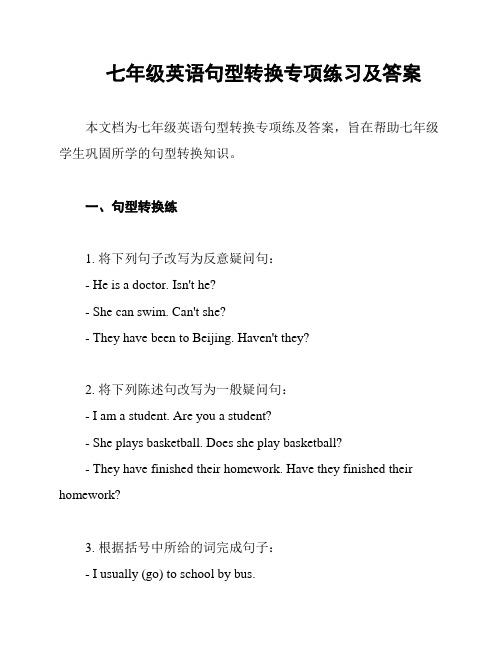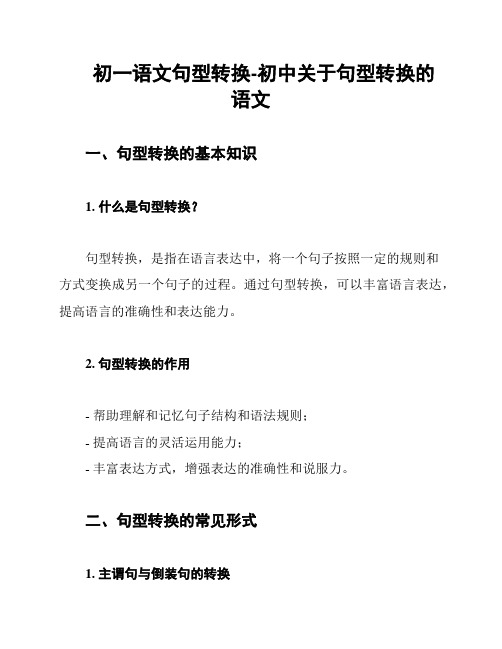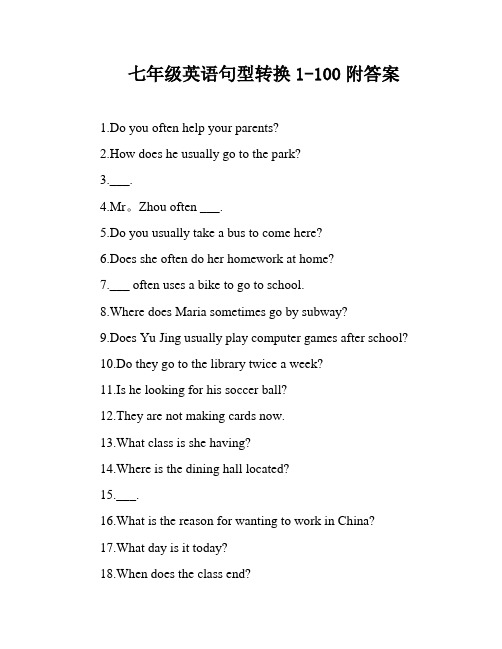初一句型转换
七年级英语句型转换专项练习及答案

七年级英语句型转换专项练习及答案本文档为七年级英语句型转换专项练及答案,旨在帮助七年级学生巩固所学的句型转换知识。
一、句型转换练1. 将下列句子改写为反意疑问句:- He is a doctor. Isn't he?- She can swim. Can't she?- They have been to Beijing. Haven't they?2. 将下列陈述句改写为一般疑问句:- I am a student. Are you a student?- She plays basketball. Does she play basketball?- They have finished their homework. Have they finished their homework?3. 根据括号中所给的词完成句子:- I usually (go) to school by bus.- He (not like) hamburgers.- We (have) a test next Monday.- They (watch) a movie last night.二、答案1. 反意疑问句:- He is a doctor. Isn't he?- She can swim. Can't she?- They have been to Beijing. Haven't they?2. 一般疑问句:- I am a student. Are you a student?- She plays basketball. Does she play basketball?- They have finished their homework. Have they finished their homework?3. 根据括号中所给的词完成句子:- I usually go to school by bus.- He doesn't like hamburgers.- We will have a test next Monday. - They watched a movie last night.。
初一语文句型转换-初中关于句型转换的语文

初一语文句型转换-初中关于句型转换的语文一、句型转换的基本知识1. 什么是句型转换?句型转换,是指在语言表达中,将一个句子按照一定的规则和方式变换成另一个句子的过程。
通过句型转换,可以丰富语言表达,提高语言的准确性和表达能力。
2. 句型转换的作用- 帮助理解和记忆句子结构和语法规则;- 提高语言的灵活运用能力;- 丰富表达方式,增强表达的准确性和说服力。
二、句型转换的常见形式1. 主谓句与倒装句的转换主谓句是指句子的谓语动词前有一个主语,而倒装句则是将主语和谓语动词的位置进行交换。
句型转换时,可以将主谓句转换为倒装句,或将倒装句转换为主谓句。
2. 陈述句与疑问句的转换陈述句是用来陈述事实、描述事物等的句子,疑问句是用来提问的句子。
句型转换时,可以将陈述句转换为疑问句,或将疑问句转换为陈述句。
3. 否定句与肯定句的转换否定句是表达否定意义的句子,肯定句则是表达肯定意义的句子。
句型转换时,可以将否定句转换为肯定句,或将肯定句转换为否定句。
三、常见的句型转换练以下是一些初中阶段常见的句型转换练,供同学们参考:1. 将下面的陈述句改写为疑问句:- 他喜欢运动。
- 她会弹钢琴。
2. 将下面的疑问句改写为陈述句:- 你喜欢吃苹果吗?- 他们有足球比赛吗?3. 将下面的肯定句改写为否定句:- 我会去参加聚会。
- 这本书很有趣。
4. 将下面的否定句改写为肯定句:- 我不会游泳。
- 这个问题没有答案。
请同学们根据自己的理解和研究情况进行句型转换练,提高语言表达能力和语法运用水平。
以上是初一语文句型转换-初中关于句型转换的语文的内容,希望对同学们的研究有所帮助。
初一句型转换

初一句型转换句型转换改为否定句改为一般疑问句对划线部分提问作肯定、否定回答同义句转换/改为复数句,单数句1)改为否定句1,有be动词在be动词后+not2.有情态动词在情态动词后加not,其它照抄2,无be动词、情态动词找助动词do/does+not,有does把动词打回原形2)改为一般疑问句1,有be动词把be动词提前,其他不变2,有情态动词把情态动词提前,其它不变3,无be动词找助动词do/does =>提到句首,记得遇到does要打回原型4,遇到I、we改为you; my,our改为your3)对划线部分提问 = 特殊疑问句=特殊词+一般疑问句特殊词:what(问什么) how(问怎么样)where(问地点)who(问谁)What class (问班级)what grade (问年级)how old (问年龄)What color (问颜色)what…look like (问长相)whose (谁的)What time(问时间)how much (问价格)how many (问多少)How much (问多少)how heavy (问多重) how often (问频率)How long (问多长)4)肯定否定回答,be动词开头,be动词结尾,助动词开头,助动词结尾练习:将下列句子变成否定句1. I am a teacher. I a teacher.2. We are students. We students.3. Jane is a girl. Jane a girl.4. They like English. They like Chinese5. I come from China. I come from China.6. He likes Chinese. He like Chinese.7. Maria comes from Cuba.Maria come from Cuba.8. We know Maria. We know Maria.练习:将下列句子变成一般疑问句1. I am a teacher. a teacher?2. They are students. Students?3. Jane is a girl. a girl?4. They like English. they like English?5. I come from China. you come from China?6. He likes Chinese. he Chinese?7. Maria comes from Cuba.Maria from Cuba?8.We speak Chinese. you Chinese? 练习:给下列句子做肯定回答或否定回答1.Are you a student?Yes, . No, .2. Do they like English?Yes, . No, .3.Is Jane a girl?Yes, . No, .4. Does Maria like China?Yes, . No, .5.Is Kangkang a student?Yes , . No , .6.Is that a girl?Yes , . No , .7.Are those telephones?Yes , . No , .8.Does Tom know Jane?Yes , . No , .9.Do they come from the U.S.A?Yes , . No , . 10.Is this an egg?Yes , . No , . 练习:划线部分提问1.My name is Nancy. your name?2.I am from China. are you from?3.I am fine . are you?4. Miss.Wang is our English teacher.is your English teacher?5.Lucy is ten years old. are you?6.He is in Class One Grade Two.is he in?7.My telephone number is 5805000.your telephone number?8.They are cars. are these ?9.This is my cap. cap is this?10.My favorite movie star is Bruce Lee.is your favorite movie star ?11.It is yellow . is it?12.She is tall. What does she ?同义句转换.1.Please give Jane the book.Please the book Jane.2. Could you please tell me your name?Could you please your name me?3. He has short hair. is short.4. I have a big nose. is big.5. You have a wide mouth.is wide.6.My English teacher is old .My English teacher is not .7. Betty is not short. Betty is .8.This is my book. This is .9.This jacket is not new. This jacket is .10.My ruler is not long. My ruler is .11.She looks like her mom.She and her mom look .12.They come from China.They China.将下列句子变成复数.It is a box . boxes .This is a ruler. rulers.That is an eraser. erasers.He is a student. students.This is a bus. . That is a pen.将下列句子变成单数。
初一英语句型转换

初一英语句型转换的专项练习练习一:肯定句变否定句1.He is a student.He is not a student.2.They like playing football.They don't like playing football.3.She can sing a song.She can't sing a song.练习二:陈述句变一般疑问句1.I am from China.Are you from China?2.He has a new bike.Does he have a new bike?3.They are watching TV.Are they watching TV?练习三:划线部分提问1.The book is on the desk. (划线部分为on the desk)Where is the book?2.He is my brother. (划线部分为my brother)Who is he?3.They are five yuan. (划线部分为five yuan)How much are they?— 1 —练习四:同义句转换1.It's time for lunch.It's time to have lunch.2.He is tall and thin.He is a tall and thin man.3.What's your name?May I know your name?以上是一些初一英语句型转换的专项练习,包括肯定句变否定句、陈述句变一般疑问句、划线部分提问和同义句转换等。
通过这些练习,你可以更好地掌握英语句型的变换规律,提高你的英语水平。
记得多做练习,多思考,相信你会越来越擅长英语句型转换的!— 2 —。
七年级英语句型转换1-100附答案

七年级英语句型转换1-100附答案1.Do you often help your parents?2.How does he usually go to the park?3.___.4.Mr。
Zhou often ___.5.Do you usually take a bus to come here?6.Does she often do her homework at home?7.___ often uses a bike to go to school.8.Where does Maria sometimes go by subway?9.Does Yu Jing usually play computer games after school?10.Do they go to the library twice a week?11.Is he looking for his soccer ball?12.They are not making cards now.13.What class is she having?14.Where is the dining hall located?15.___.16.What is the reason for wanting to work in China?17.What day is it today?18.When does the class end?19.What subject are you currently studying?20.How many lessons do they have every day?21.There is no picture on the wall.22.What is she making?23.There are boys in the room.24.Does Tom have books?25.___.26.How many days are there in a week?27.Where are your shoes located?28.Are there any books and a pen on my desk?29.Would you like to go to school by bus?30.What is on the table near the window?31.What is in the living room?32.There are no computers in our school.33.Is your study on the first floor or the second floor?34.Where are your books?___.36.There are some old men in the room.37.There is no meat on the plate.38.Is there a map of Beijing on the wall。
初一英语句型转换大全

初一英语句型转换大全Title: Junior High English Sentence Transformation Guide.Introduction.Sentence transformation in English is an essentialskill that helps students enhance their language proficiency and creativity. It involves converting a given sentence into another form without changing its original meaning. This guide covers various sentence transformation techniques suitable for junior high students, providing examples and explanations to aid understanding.1. Active Voice to Passive Voice.Active Voice: John wrote a book.Passive Voice: A book was written by John.Explanation: In the active voice, the subject performs the action, while in the passive voice, the action is performed on the subject.2. Simple Sentence to Compound Sentence.Simple Sentence: She is smart. She studies hard.Compound Sentence: She is smart and studies hard.Explanation: A simple sentence has one subject and one predicate. A compound sentence combines two or more simple sentences using coordinating conjunctions.3. Direct Speech to Indirect Speech.Direct Speech: "I am coming," he said.Indirect Speech: He said that he was coming.Explanation: Direct speech is when someone speaks directly to the listener, while indirect speech reportswhat someone said without using quotation marks.4. Affirmative Sentence to Negative Sentence.Affirmative Sentence: She is a doctor.Negative Sentence: She is not a doctor.Explanation: An affirmative sentence asserts a fact, while a negative sentence denies it.5. Declarative Sentence to Interrogative Sentence.Declarative Sentence: He is a teacher.Interrogative Sentence: Is he a teacher?Explanation: A declarative sentence makes a statement, while an interrogative sentence asks a question.6. Transformation of Simple Present Tense to Simple Past Tense.Simple Present Tense: She watches TV every day.Simple Past Tense: She watched TV every day.Explanation: The simple present tense is used for actions that occur regularly or habits, while the simple past tense is used for actions that occurred in the past.7. Transformation of Simple Future Tense to Future Perfect Tense.Simple Future Tense: I will visit my grandparents next week.Future Perfect Tense: I will have visited my grandparents by next week.Explanation: The simple future tense expresses actions in the future, while the future perfect tense expresses actions that will be completed in the future.8. Transformation of Simple Present Tense to Present Continuous Tense.Simple Present Tense: She studies hard.Present Continuous Tense: She is studying hard.Explanation: The simple present tense is used for general truths or habits, while the present continuous tense is used for actions that are currently happening.Conclusion.Sentence transformation is a crucial skill in English language learning. Junior high students can enhance their language proficiency by practicing and applying these transformation techniques. With regular practice, they will be able to create more varied and interesting sentences, improving their communication skills.。
初一英语句型转换
初一英语句型转换专项——句型转换一、含有be动词的陈述句变一般疑问句和否定句1.Is the student at school?2.Are the students at school?3.Is his father not an English ___?4.Are these cats not crying?5.Is he not crying under the tree?6.Is ___ November?7.Are Mrs。
Li and Kitty in a big shop?8.Is everybody not in the classroom?9.Is the boy under the tree not hungry?10.Is your brother's aunt not on the chair?11.Is there not an eraser on the desk?12.Are those not your keys?13.Is John not his first name?14.Is my father not fine?15.Is this not a short?16.Are there not two pens in the pencil case?17.Are the boys not my good friends?二、不含be动词(即含行为动词)的陈述句变一般疑问句和否定句1.Can they not swim?2.Do you not like to read English?3.Do you not go to school on foot?4.Does he not like English?5.Does his father not go to work by bus?6.Does he not go to school every day?7.Do you not want to have a model car?8.Does she not want a cup of coffee?9.Do Mrs。
初一英语句型转换试题答案及解析
初一英语句型转换试题答案及解析1.【1】Andy is American. (同义句)Andy ______ _______America.【答案】comes from【解析】句意为:安迪是美国人。
联系转换后的句子可知,其同义于“安迪来自美国”。
由于主语是第三人称单数故可填:comes from或is from。
【2】He is in Huang he Football Team.(同义句)He is_______ _______ _______ Huang he Football Team.【答案】a member of【解析】句意为:他在黄河足球队。
联系转换后的句子可知,其同义于“他是黄河足球队的一个成员”。
“---的一个成员”在英语中应表达为:a member of。
【考点】句式变换。
2.【1】My father and mother are teachers.(改为同义句) My teachers.【答案】parents, are【解析】句意:我的爸爸、妈妈是老师。
这个题目要求我们改为同义句,原句中是用的fatherand mother,爸爸、妈妈,我们可以用一个单词parents来表示相同的意思,即父母,并且因为主语是复数的,所以用are。
【2】The CDs are on the desk. (对划线部分提问) the CDs?【答案】where are【解析】句意:这些光盘在桌子上。
这个题目要求我们对划线的部分进行提问,on the desk的意思是在桌子上,因此我们应该问在哪里,疑问词是where,然后把句中的are提前,变成疑问句。
【3】This is my book.(改为同义句) This book .【答案】is mine【解析】句意:这是我的书。
这个题目要求我们变为同义句,根据句意可知,这是我的书,即这本书是我的。
mine是一个名词性的物主代词,在句中做表语,即my book。
七年级英语句型转换练习题及答案
七年级英语句型转换练习题及答案1. 一般疑问句转换成陈述句:Did they go to the park? → They went to the park.Do you like basketball? → You like basketball.2. 直接引语转换成间接引语:She said, "I am going to the movies." → She said that she was going to the movies.He asked, "Do you have any siblings?" → He asked if I had any siblings.3. 否定句转换成肯定句:She doesn't play the piano. → She plays the piano.They don't like apples. → They like apples.4. 一般现在时转换成一般过去时:I study English every day. → I studied Englis h every day.She goes to school by bus. → She went to school by bus.5. 一般过去时转换成一般将来时:They visited their grandparents last week. → They will visit their grandparents next week.He went to the library yesterday. → He will go to the library tomorro w.6. 现在进行时转换成一般现在时:They are playing soccer. → They play soccer.She is studying in the library. → She studies in the library.7. 一般将来时转换成一般现在时:We will travel to Japan next month. → We travel to Japan every month.He will finish his homework later. → He finishes his homework later.8. 定义性从句转换成非定义性从句:The book that is on the table is mine. → The book on the table is mine.The girl who is wearing a red dress is my friend. → The girl wearing a red dress is my friend.9. 反意疑问句转换成陈述句:You don't like ice cream, do you? → You don't like ice cream.He isn't coming to the party, is he? → He isn't coming to the party.10. 选择疑问句转换成陈述句:Would you like tea or coffee? → You would like tea or coffee.Can we go to the park or the movies? → We can go to the park or the movies.以上是七年级英语句型转换练习题及答案,希望对你的学习有所帮助。
初一英语句型转换单选题40题
初一英语句型转换单选题40题1. You are a student.(改为一般疑问句)Are you a student?答案解析:一般疑问句将be 动词提前,首字母大写,句末用问号。
原句中的“you”在一般疑问句中位置不变。
2. She is a teacher.(改为一般疑问句)Is she a teacher?答案解析:一般疑问句将be 动词提前,首字母大写,句末用问号。
原句中的“she”在一般疑问句中位置不变。
3. They are in the classroom.(改为一般疑问句)Are they in the classroom?答案解析:一般疑问句将be 动词提前,首字母大写,句末用问号。
原句中的“they”在一般疑问句中位置不变。
4. I am happy.(改为一般疑问句)Are you happy?答案解析:一般疑问句将be 动词提前,首字母大写,句末用问号。
原句中的“I”在一般疑问句中变为“you”。
5. He is from Beijing.(改为一般疑问句)Is he from Beijing?答案解析:一般疑问句将be 动词提前,首字母大写,句末用问号。
原句中的“he”在一般疑问句中位置不变。
6. We have English class on Monday.(改为一般疑问句)Do you have English class on Monday?答案解析:一般疑问句借助助动词do,将其提前,首字母大写,句末用问号。
原句中的“we”在一般疑问句中变为“you”。
7. She likes apples.(改为一般疑问句)Does she like apples?答案解析:一般疑问句借助助动词does,将其提前,首字母大写,句末用问号。
原句中的“likes”变为“like”。
8. They play basketball after school.(改为一般疑问句)Do they play basketball after school?答案解析:一般疑问句借助助动词do,将其提前,首字母大写,句末用问号。
- 1、下载文档前请自行甄别文档内容的完整性,平台不提供额外的编辑、内容补充、找答案等附加服务。
- 2、"仅部分预览"的文档,不可在线预览部分如存在完整性等问题,可反馈申请退款(可完整预览的文档不适用该条件!)。
- 3、如文档侵犯您的权益,请联系客服反馈,我们会尽快为您处理(人工客服工作时间:9:00-18:30)。
初一句型转换集团标准化小组:[VVOPPT-JOPP28-JPPTL98-LOPPNN]句型转换【教学目标】考点1:陈述句(肯定陈述句、否定陈述句)的句型结构(重点)考点2:祈使句的句型结构考点3:疑问句(一般疑问句、选择疑问句、特殊疑问句)的句型结构(难点)【教学过程】一、检查与测试1. I know the answer.(一般疑问句) ______ ______ know the answer?2. We can see some birds.(一般疑问句) ______ ______ see ______ birds?3. There are some apples on the tree.(否定式)There ______ ____________ apples on the tree.4. I think he is very old.(否定句) I ______ think he ______ very old.5. Her sweater is red.(对划线部分提问) ______ ______ is her sweater?6. Can't you find the map?(作肯定回答) ______ ,I______ .二、考点突破考点1:陈述句的句型结构构成分析肯定陈述句 a. This is a book. (be动词)b. He looks very young. (连系动词)c. I want a sweat like this. (实义动词)d. I can bring some things to school. (情态动词)e. There’s a computer on my desk. (There be结构)否定陈述句a. These aren’t their books.b. They don’t look nice.c. Kate doesn’t go to No. 4 Middle School.d. Kate can’t find her doll.e. There isn’t a cat here. (=There’s no cat here.)【配套例题】一、按要求完成句子(1)改为否定句:1. I am a student.→2. They are English cars. →3. There are many apples on the tree.4. You can go to h ave a look. →5. Come here, please. →6. He can speak English. →(2)改为肯定句:7. It isn’t a rule. →8. My mother can’t sing. →9.There aren’t any people. →10.She doesn’t like her new skirt. →考点2. 祈使句肯定祈使句 a. Please go and ask the man.b. Be quiet, please!c. Let’s learn English!否定祈使句 a. Don’t be late.b. Don’t hurry.【配套例题】一、英汉互译。
1. Be kind to our sister. 。
2. Watch your steps. 。
3.不要开门。
_____________________ .4.不要太累。
____________________ .5.让我们去打篮球吧。
.考点3 . 疑问句(1)一般疑问句 a. Is Jim a student?b. Can I help you?c. Does she like salad?d. Do they watch TV?e. Is she reading?肯定回答: (a) Yes, he is. (b) Yes, you can. (c) Yes, she does.(d) Yes, they do. (e) Yes, she is.否定回答: (a) No, he isn’t. (b) No, you can’t. (c) No, she doesn’t. (d) No, they don’t. (e) No, she isn’t.(2) 选择疑问句 Is the table big or small? 回答It’s big./ It’s small.(3) 特殊疑问句1. 问年龄 How old is Lucy? She is twelve.2. 问种类 What kind of movies do you like? I like action movies and comedies.3. 问身体状况 How is your uncle? He is well/fine.4. 问方式 How do/can you spell it? L-double O-K.How do we contact you? My e-mail address is cindyjo5. 问原因 Why do you want to join the club?6. 问时间What’s the time? (=What time is it?) It’s a quarter toten a.m..What time do you usually get up, Rick? At five o’clock.When do you want to go? Let’s go at 7:00.7. 问地方Where’s my backpack? It’s under the table.8. 问颜色 What color are they? They are light blue.What’s your favorite color? It’s black.9. 问人物Who’s that? It’s my sister.Who is the boy in blue? My brother.Who isn’t at school? Peter and Emma.Who are Lisa and Tim talking to?10. 问东西What’s this/that (in English)? It’s a pencil case.What else can you see in the picture? I can see some broccoli, strawberries and hamburgers.11. 问姓名What’s your aunt’s name? Her name is Helen./She’s Helen.What’s your first name? My first name’s Ben.What’s your family name? My family name’s Smith.12. 问哪一个 Which do you like? I like one in the box.13. 问字母What letter is it? It’s big D/small f.14. 问价格How much are these pants? They’re 15 dollars.15. 问电话号码What’s your phone number? It’s 576-8349.16. 问谓语(动作) What’s he doing? He’s watching TV.17. 问职业(身份) What do you do? I’m a teacher.What’s your father?He’s a doctor.【配套例题】一、就划线部分提问:1.Your book is here. →_____________ __________ your book?2.I’m thirteen. →3.That’s a map in English. →______________ _______________ inEnglish?4.They are boxes. →_____________ _______________ they?5.The woman is Mrs. Read. →______________ _______________ thewoman?6.Mr. Zhang is at home. →_______________ Mr. Zhang?7.The flowers are near the window. →______________ _____________the flowers?三、课堂总结1、知识小结:2、方法小结:3、表现小结:四、当堂测试与讲评一、按要求完成句子(要求:A:改为一般疑问句 B:改为否定句)1. This is a pencil-box. →A: B:2. Its name is Polly. →A: B:3. Jim is at school. →A: B:4. These are my English books. →A:B:5.I know his nam e. →A: B:6.Please look after your cat. →B7. There is some money in the purse. →A:B:二、回答句子(A:肯定回答 B:否定回答)1. Are you a teacher? → A: B:2. Is this your ruler? → A: B:3. Are those banana trees? →A: B:4. Is it a nice room? → A: B:5. Is there a picture on the wall? →A: B:6. Are there any trees on the hill? →A: B:7. Can you see a bird in the sky? →A: B:8. Do you know Mr Wang? →A: B:三、单复数句变换(把单数的句子变成复数,复数的变成单数):1.Is this your box? →:2.There is a boy in the picture. →3.That is his new book. →4.It is a Chinese car. →5.She is a woman worker. →6.We have many old pictures. →7.Are those English books? →8.They are Japanese students. →9.Who are those men over there? →10.They are some policemen. →四、将下列句子改为选择疑问句:1.Tom is in Class Three. (用Class Two)→_________ Tom in ClassThree __________ Class Two?2.Sam is eleven. (用twelve)→___________ Sam eleven ___________twelve?3.Is she in Team Two? Is she in Team Three? (合并)→4.Your English teacher is a man. (用a woman)→_______ yourEnglish teacher a man ______ a woman?5.Those are apples. (用pears)→_________ those apples __________pears?6.There are some sheep on the hill.(用dogs)→________ there________ sheep or ________ on the hill?五、作业布置一、连词成句:1.is , your , what , name (?)→2.good , to , you , morning (.)→ , is , Green , my , Mr. (.)→4.to , too , nice , you , meet (.)→5.that , English , is , in , what (?)→6.you , Two , are , Row , in (?)→7.School , this , No. , Middle , 14 , is (?)→8.see , can , your , please , I , license , car (?)→9.that , is , his , her , pen , pen , or (?)→10.isn’t , today , who , school , at (?)→三、把下列句子改为否定疑问句,并作肯定和否定回答:例:I am a student. → Aren’t you a student? Yes, I am. / No, I am not.1.I am Chinese. →2.I can open the door and get the ball. →3.I know his address. →4.It’s over the hill. →5.Miss Gao is an English teacher. →6.There’re six people in my family. →7.There is some money on the floor. →8.Between the two trees there are some flowers.六、教学反思。
